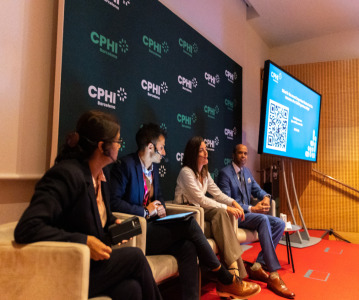Commerce minister's intervention sought to stop enforcing barcodes on pharma exports
The Medicines and Healthcare Products Agency (MHRA) is having consultations with the pharma industry and clinical research organisations (CROs) about the European Commission’s proposal to have a new clinical trials regulation.
The Medicines and Healthcare Products Agency (MHRA) is having consultations with the pharma industry and clinical research organisations (CROs) about the European Commission’s proposal to have a new clinical trials regulation. The MHRA is committed to ensure that the proposed regulatory framework does not create unnecessary burden on researchers but would only ensure making Europe Union (EU) attractive and competitive for human studies. Global and Indian pharma companies/CROs would need to provide their views by December 31, 2012.
Two companies from Karnataka namely Biocon and CRO Ecron Acunova are present in the EU. The former’s Oral Insulin IN105 underwent clinical trials in the EU and the latter has its European headquarters in Frankfurt, Germany.
The EC is keen to have one submission for both single-state and multi state trials replacing the current practice of separate submissions to the National Competent Authority and the Ethics Committees.
The proposed Regulation will replace the Clinical Trials Directive 2001/20/EC which was a concern amongst commercial and academic researchers since its introduction in 2004. The Directive reduced the attractiveness of the EU for clinical trials because it brought administrative and regulatory hassles, lacked clarity, created delays and increased costs for researchers. This led fall in the number of clinical trials conducted in the EU by 25 per cent between 2007 and 2011. Similarly in the UK too, clinical trials fell by 22 per cent over the same period. Therefore, the Government made the revision a priority in the 2011 Plan for Growth. It felt the Commission’s proposal created a more favourable environment for clinical trials in the EU, reported MHRA.
The Commission’s Impact Assessment estimates that the proposal will reduce administrative costs by 270 million Euros across the EU as a consequence of streamlining the authorisation procedure. It would also bring down the compliance costs by Euros 440 million and generate savings to the tune of Euros 34 million removing the requirements for insurance and reducing the requirements for safety reporting for low interventional trials.
“It is heartening to note the objectives of change. The EU is demonstrating that a regulator has to balance the interest of several stakeholders in the life science research ecosystem. While regulators and NGOs in some countries are primarily focused on participant safety and public health, MHRA publicly accepted that changes in regulation it effected in early 2000 slowed down the number of clinical trials in their geography by 25 per cent. In order to promote academic and pharmaceutical research towards better health care, MHRA is willing to remove hurdles and ambiguities which increases time and cost to take new medicines to clinic. This will make Europe regain its competitive edge in clinical research, said DA Prasanna, chairman and founder, Ecron Acunova.
The proposed changes to the EU’s Clinical trial regulations are timely and in the right direction. The scope of changes and the central theme: ‘Risk-adapted regulation’ would allow judicious use of regulators’ limited resources and time. It would encourage many Indian generic drugs and biosimilar product companies to conduct clinical trials in EU by reducing time, complexity and cost and allowing affordable and safe products to be made available to patients quickly. This is in line with other regulatory agencies like the US FDA, which has also proposed risk based monitoring but is lot more comprehensive. India also could look at adapting some of the important aspects of these proposed changes to simplify, streamline the regulatory process for drug development, stated Nageswara Rao, general manager, Clinigene International, a subsidiary of Biocon.
Related News
-
News Women in Pharma: Our hopes for 2025 and beyond
Our last instalment for 2024 of the Women in Pharma series brings you messages direct from the Informa Markets CPHI team as they discuss the advice and insights they have carried throughout their roles working at CPHI, and what they hope to see for the... -
News CPHI Milan 2024 - From the Floor
Milan and CPHI welcome you to 2024 CPHI Milan! As we celebrate the 35th edition of our flagship CPHI show, editors Vivian Xie and Lucy Chard bring you the latest from the show floor, conference sessions, and innovative solutions from all exhibitors, at... -
News The BIOSECURE Act: implications for the pharma supply chain
On September 9, 2024, the US House of Representatives voted to pass the bill titled the BIOSECURE Act (the Act), which lists several Chinese companies in the pharmaceutical supply chain. The Act will prohibit American companies from contracting or doin... -
News A Day in the Life of a Global CDMO Chapter Lead – Manufacturing
The 'Day in the Life of' series has covered many aspects of the pharmaceutical pipeline, including R&D and procurement, now we're taking a look at manufacturing from a global CDMO perspective. -
News CPHI Milan Speaker Spotlight: CDMO relations with Pharma and Start-Ups
In the run-up to CPHI Milan, we sit down with some of the experts and thought-leaders speaking at this year’s conferences. -
News Women in Pharma: Advocating for trans healthcare in pharma
In our monthly series on women in the pharmaceutical industry, we interview leading experts in the pharmaceutical supply and value chain to discuss the importance of gender diversity in healthcare, the workplace, and beyond. -
News Updated – Changing abortion pill access according to the US FDA and Supreme Court
After the approval of the medical abortion pill, mifepristone, by the US FDA, states across the USA approach the distribution of the pill differently, some ruling against allowing access to the drug. -
News CPHI North America 2024 – From the Floor
Welcome to Philly! CPHI North America once again graces the Philadelphia Convention Center, 7–9 May 2024.
Recently Visited
Position your company at the heart of the global Pharma industry with a CPHI Online membership
-
Your products and solutions visible to thousands of visitors within the largest Pharma marketplace
-
Generate high-quality, engaged leads for your business, all year round
-
Promote your business as the industry’s thought-leader by hosting your reports, brochures and videos within your profile
-
Your company’s profile boosted at all participating CPHI events
-
An easy-to-use platform with a detailed dashboard showing your leads and performance
.png)




.png)

